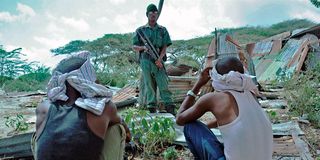Working jointly as a region is key to winning terror war

A Somali officer guards suspected Al-Shabaab.
Multilateral and bilateral relations have a significant and irreplaceable role in fighting terrorism. The use of this form of diplomacy dates back to the Roman Empire, where it was instrumental in the discourse on peaceful management of international relations, mostly through negotiations between states.
Being a transnational threat, terrorism requires cross-border, regional and international collaboration. Most countries on the continent have realised that, bringing us closer to African Union’s (AU) Agenda 2063. DR Congo, which joined the East African Community (EAC) in May, has welcomed regional forces to flush out rebels and terrorists who cause the people untold suffering, especially in the east.
The force comprises troops from Kenya, Uganda, South Sudan and Tanzania. The anchor state in the bloc, Kenya, plays a lead role in fighting insecurity in eastern DRC and is deploying logistical systems. Its contingent is expected to return normalcy to Bunagana, on the Ugandan border. Earlier, Kenya’s most wanted terrorist Salim Rashid alias Chotara was arrested in a Congolese village. A top commander in the Allied Democratic Forces (ADF) terrorist group, domiciled in Uganda and DRC, he faced charges over terrorism and Islamic State membership.
The security intervention reinforces the deliberations of the Nairobi Process, where the heads of state expressed concern on rising insecurity in eastern DRC and on promoting stability and development.
Peace and security
Consequently, Tanzania and Mozambique have also entered into memoranda of understanding on peace and security to protect their common border against the Al-Shabaab insurgency in Cabo Delgado and other provinces of northern Mozambique.
Neighbours Rwanda and DRC can attest to the danger which M23 and other armed militia pose. The ticking time bomb has forced the two sworn arch-rivals to bury the hatchet to tackle the ballooning M23 and other rebel groups domiciled in DRC.
Rwanda has had a successful engagement with the Southern African Development Community (SADC) to contain violent extremism in northern Mozambique. Kenya has also registered remarkable success in containing the Al-Shabaab threat in Somalia, both in “Operation Linda Nchi” and as part of the AU Mission to Somalia (Amisom), and now, AU Transition Mission in Somalia.
Kenya has, over the years, been receptive to contributing peacekeepers regionally and globally and is a luminary of peace efforts in a region that has courted numerous civil wars and political strife. It is feted for peace processes in Mozambique, Sudan and South Sudan and is a stabilizer, like in the cases of Somalia and South Sudan. Its geo-strategic location positions the country as an important partner in the global war against terrorism.
There is enough proof that regional or bilateral initiatives go a long way in containing violent extremism. These successes and collaborations between countries reinforce the need for such partnerships.
Mr Mugwang’a, a communications consultant, is a member of the Crime Journalist Association of Kenya (CJAK). [email protected].





